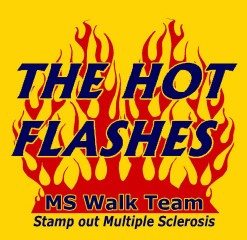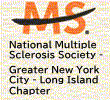Resident helps raise
record
amounts for MS research
By RICHARD LIEBSON
THE JOURNAL NEWS
(Original publication: April 22, 2007)
WHITE PLAINS - It started in 2000 when Dr. Alan Legatt and three
friends from a road runners group decided to participate in the
National Multiple Sclerosis Society's annual MS Walk at Rye Playland.
Taking pledges from friends, the team raised $1,236, walking in a freak
spring blizzard.
In the process, Legatt, of White Plains, "turned into a fanatic.''
The proof? In the years since that first walk, Legatt, professor of
clinical neurology at the Albert Einstein School of Medicine and a
director of several programs at Montefiore Hospital, has recruited,
coaxed and cajoled seemingly everyone he knows to join the Hot Flashes
or to pledge money for the MS Walk. The results have been staggering.
Last year, the team had 313 members and raised $76,850 - the highest
total of any team in southern New York and eighth out of more than
12,000 teams that participate in MS walks nationwide.
"I'm normally not a pushy person, but for this, I can be pushy,''
Legatt said with a shrug.
Today, he's hoping to raise even more at the Playland event. With 1,800
walkers already committed, organizers are counting on nice weather to
attract more people to register at 9 a.m. - an hour before the walk
begins.
"The weather's been bad so registration has been a little slow this
year,'' Legatt said. "I hope people come out, register and join the Hot
Flashes. But even if they don't join my team, the important thing is
for them to come out and support the cause."
"He's the epitome of good volunteerism,'' said Terry Ebersole of the MS
Society. "Dr. Legatt is a critical component to the success of what we
do here.''
While all participants receive a T-shirt from the MS Society, those who
choose to join Legatt's group will get a specially designed shirt with
the Hot Flashes logo. The shirts are donated by Yossi Berkovitch, a
teammate who goes to the same synagogue as Legatt.
Two of Legatt's family members suffer from the chronic neurological
disease that affects the central nervous system. Although the disease
affects 400,000 Americans with unpredictable symptoms that include
reduced vision, lost muscle control, numbness and immobility, Legatt
said that progress is being made.
"When I was a resident, we had some medications that dealt with some of
the effects of the damage caused by MS,'' he said. "Now we have
treatments that prevent the damage and slow down the progress of the
disease.''
Legatt does not treat MS patients, but he does attend conferences where
he's learned that "amazing research is coming down the pike. A number
of times I've seen research that received direct support from the MS
Society, so I really understand how important fundraising efforts such
as the MS Walk really are.''
 The Hot Flashes participate in
MS Walks organized by the:
The Hot Flashes participate in
MS Walks organized by the:
 This Web site was
This Web site was 

